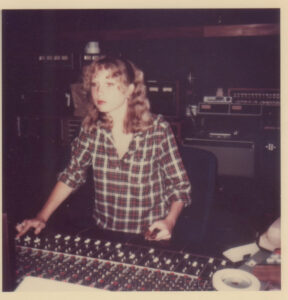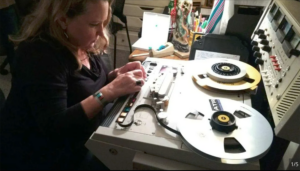 RECORDING ENGINEER
RECORDING ENGINEER
PRODUCER
FOLEY MIXER
FOREIGN DUBBING SUPERVISOR
ARCHIVIST
AUDIO REPAIR
AUDIO PRESERVATION
CONSULTANT
EDUCATOR
Lenise Bent was one of a few women working in Hollywood recording studios in a technical role in the 1970s and was the first woman to receive an RIAA Platinum certified album.
RECORDING ENGINEER
PRODUCER
FOLEY MIXER
FOREIGN DUBBING SUPERVISOR
ARCHIVIST
AUDIO REPAIR
AUDIO PRESERVATION
CONSULTANT
EDUCATOR
Lenise Bent was one of a few women working in Hollywood recording studios in a technical role in the 1970s and was the first woman to receive an RIAA Platinum certified album.
Lenise grew up in Los Angeles, CA. At age 8, she and her brother were in the Screen Children’s Guild and worked as an extra for TV and film. She later recalled being more fascinated with the process and the production as opposed to the acting. Her family was musical, and her eldest brother often brought home gear to repair from his job at an electronics store. She owned her first tape recorder before her 8th birthday. She studied piano and flute and made her first recording at 9 years old (with the Compton Youth Symphony Orchestra). Growing up, she was interested in seeing films and watching live music.
She studied Film & TV and radio production at the University of Southern California (USC) and California State Long Beach. She then studied audio engineering at SoundMasters Recording School, which was one of the only recording schools at the time.
Music
 Bent worked as an assistant engineer at The Village Recorders studio in Los Angeles. She was hired in August 1976 and was one of four women on engineering staff. Her credits included Aja by Steely Dan; Breakfast in America by Supertramp; Tusk by Fleetwood Mac. She worked her way up to engineer (her first session in April 1977) and became chief engineer for Mike Chapman. She engineered AutoAmerican by Blondie and other of Chapman’s artists such as The Knack and Suzi Quatro. Bent engineered at other major studios such as United Western, The Record Plant, and Air London. She is known for being the first woman to receive an RIAA Platinum album for engineering (for AutoAmerican by Blondie). She is also recognized for being one of the few women working in the Hollywood recording studio studios (in a technical role) during the 1970s.
Bent worked as an assistant engineer at The Village Recorders studio in Los Angeles. She was hired in August 1976 and was one of four women on engineering staff. Her credits included Aja by Steely Dan; Breakfast in America by Supertramp; Tusk by Fleetwood Mac. She worked her way up to engineer (her first session in April 1977) and became chief engineer for Mike Chapman. She engineered AutoAmerican by Blondie and other of Chapman’s artists such as The Knack and Suzi Quatro. Bent engineered at other major studios such as United Western, The Record Plant, and Air London. She is known for being the first woman to receive an RIAA Platinum album for engineering (for AutoAmerican by Blondie). She is also recognized for being one of the few women working in the Hollywood recording studio studios (in a technical role) during the 1970s.
For Aja, Bent studied Steely Dan’s previous albums (including who played on them and engineered). She says that  level of study paid off. One of her mentors was the engineer on that album, Roger Nichols. She learned from Donald Fagen to make things right versus making things perfect.
level of study paid off. One of her mentors was the engineer on that album, Roger Nichols. She learned from Donald Fagen to make things right versus making things perfect.
Bent moved into post-production (for film and television) but continues to work on music. In 2016, she recorded an all analog album with the band The Barrelhouse Kings. 2018, she recorded Primal King’s self-titled album at United Recordings using all analog equipment.
When asked, “What is the key to recording a great sound?” Lenise replied, “Capturing the performance the best way you possibly can, meaning using the right mic for that instrument or voice, put in the right place. And I prefer to work quickly while the energy is up.”
Her favorite pre-amps are Neve 1073 and Neumann 67 is her favorite mic.
Post-Production
Lenise moved into post-production audio and now also works as a sound editor, sound supervisor and re-recording mixer. She has recorded, engineered and mixed music, voice-over, ADR and Foley. She has produced vocals and dialog for the foreign language versions of the films Shrek, Spirit, and Shrek 2.
Lenise grew up in Los Angeles, CA. At age 8, she and her brother were in the Screen Children’s Guild and worked as an extra for TV and film. She later recalled being more fascinated with the process and the production as opposed to the acting. Her family was musical, and her eldest brother often brought home gear to repair from his job at an electronics store. She owned her first tape recorder before her 8th birthday. She studied piano and flute and made her first recording at 9 years old (with the Compton Youth Symphony Orchestra). Growing up, she was interested in seeing films and watching live music.
She studied Film & TV and radio production at the University of Southern California (USC) and California State Long Beach. She then studied audio engineering at SoundMasters Recording School, which was one of the only recording schools at the time.
Music
 Bent worked as an assistant engineer at The Village Recorders studio in Los Angeles. She was hired in August 1976 and was one of four women on engineering staff. Her credits included Aja by Steely Dan; Breakfast in America by Supertramp; Tusk by Fleetwood Mac. She worked her way up to engineer (her first session in April 1977) and became chief engineer for Mike Chapman. She engineered AutoAmerican by Blondie and other of Chapman’s artists such as The Knack and Suzi Quatro. Bent engineered at other major studios such as United Western, The Record Plant, and Air London. She is known for being the first woman to receive an RIAA Platinum album for engineering (for AutoAmerican by Blondie). She is also recognized for being one of the few women working in the Hollywood recording studio studios (in a technical role) during the 1970s.
Bent worked as an assistant engineer at The Village Recorders studio in Los Angeles. She was hired in August 1976 and was one of four women on engineering staff. Her credits included Aja by Steely Dan; Breakfast in America by Supertramp; Tusk by Fleetwood Mac. She worked her way up to engineer (her first session in April 1977) and became chief engineer for Mike Chapman. She engineered AutoAmerican by Blondie and other of Chapman’s artists such as The Knack and Suzi Quatro. Bent engineered at other major studios such as United Western, The Record Plant, and Air London. She is known for being the first woman to receive an RIAA Platinum album for engineering (for AutoAmerican by Blondie). She is also recognized for being one of the few women working in the Hollywood recording studio studios (in a technical role) during the 1970s.
For Aja, Bent studied Steely Dan’s previous albums (including who played on them and engineered). She says that level of study paid off.

One of her mentors was the engineer on that album, Roger Nichols. She learned from Donald Fagen to make things right versus making things perfect.
Bent moved into post-production (for film and television) but continues to work on music. In 2016, she recorded an all analog album with the band The Barrelhouse Kings. 2018, she recorded Primal King’s self-titled album at United Recordings using all analog equipment.
When asked, “What is the key to recording a great sound?” Lenise replied, “Capturing the performance the best way you possibly can, meaning using the right mic for that instrument or voice, put in the right place. And I prefer to work quickly while the energy is up.”
Her favorite pre-amps are Neve 1073 and Neumann 67 is her favorite mic.
Post-Production
Lenise moved into post-production audio and now also works as a sound editor, sound supervisor and re-recording mixer. She has recorded, engineered and mixed music, voice-over, ADR and Foley. She has produced vocals and dialog for the foreign language versions of the films Shrek, Spirit, and Shrek 2.

